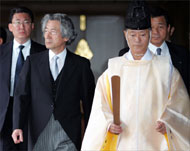Factfile: China-Japan relations
Shinzo Abe, the new Japanese prime minister, is meeting Hu Jintao, the Chinese president, in Beijing in what will be the first bilateral meeting in years between leaders of the two Asian powers. Following is an overview of the country’s ties.

Historical disputes
Japan invaded and occupied large parts of China from 1931 to 1945 and memories of Japanese atrocities run deep. China has said apologies made by its leaders are not sincere.
There are two main flashpoints:
1 Yasukuni Shrine: Ties grew chilly after Junichiro Koizumi became prime minister in 2001 and began yearly visits to Yasukuni, where Japanese leaders from the second world war, convicted as war criminals by an Allied tribunal, are honoured along with the nation’s millions of war dead.
 |
|
Ties grew chilly after Koizumi’s |
2 School textbooks: A group of nearly 200 Japanese and South Koreans are attempting to sue Abe for supporting a school history textbook they say glosses over Japan‘s military aggression before and during the second world war. Japan‘s annual textbook revisions regularly provoke public protests across China.
Territorial and energy disputes
The ownership of gas fields in the East China Sea has long been a source of tension. The area is near a group of islands, known as Senkaku in Japan and Diaoyu in China, over which both Tokyo and Beijing claim sovereignty.
China has criticised Japan for granting exploration rights to private companies. Japan objects to China starting work in the area, fearing it could tap into resources beyond what Tokyo recognises as a midway line in the waters.
China and Japan are the world’s second- and third-largest consumers of crude oil after the US. Both are looking to diversify their energy mix.
Economic ties
China replaced the US as Japan‘s top trade partner in 2004.
Japan‘s trade with China, including Hong Kong, was worth about 25 trillion yen ($212 billion) last year.
Strategic rivalry
 |
|
China is wary of Japan’s efforts |
Violent anti-Japan protests erupted in China in April 2005. Thousands of Chinese took to the streets to protest over Japan‘s bid for a seat on the United Nations Security Council and to express anger over the alleged whitewashing of wartime history in government-approved school textbooks.
Japan, which wants a bigger global security role, worries about China‘s rising military spending. It has consistently opposed the lifting of the EU’s 1989 ban on selling arms to China, imposed after Beijing‘s Tiananmen Square crackdown.
Beijing is wary of Tokyo‘s efforts to escape the limits of its pacifist post-war constitution on military activity abroad. North Korea‘s missile tests in July have also driven Tokyo to speed up its cooperation with the United States on missile defence.